小学英语形容词的比较级
完整小学英语比较级和最高级
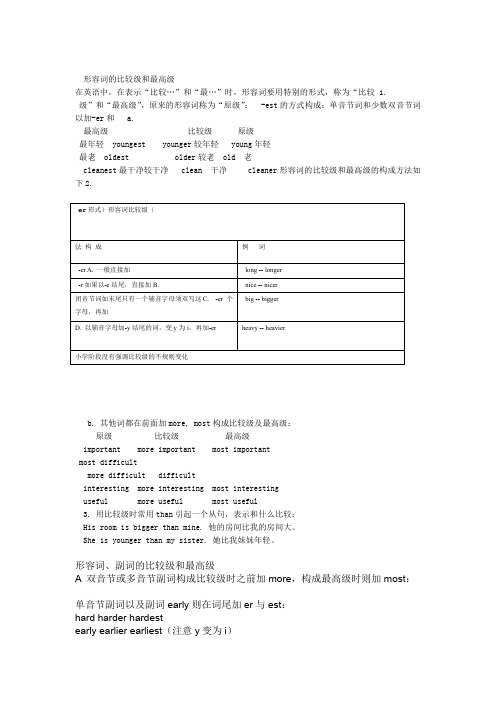
形容词的比较级和最高级在英语中,在表示“比较…”和“最…”时,形容词要用特别的形式,称为“比较 1.级”和“最高级”,原来的形容词称为“原级”: -est的方式构成:单音节词和少数双音节词以加-er和 a.最高级比较级原级最年轻 youngest younger较年轻 young年轻最老 oldest older较老 old 老cleanest最干净较干净 clean 干净 cleaner形容词的比较级和最高级的构成方法如下2.b. 其他词都在前面加more, most构成比较级及最高级:原级比较级最高级important more important most importantmost difficultmore difficult difficultinteresting more interesting most interestinguseful more useful most useful3. 用比较级时常用than引起一个从句,表示和什么比较:His room is bigger than mine. 他的房间比我的房间大。
She is younger than my sister. 她比我妹妹年轻。
形容词、副词的比较级和最高级A 双音节或多音节副词构成比较级时之前加more,构成最高级时则加most:单音节副词以及副词early则在词尾加er与est:hard harder hardestearly earlier earliest(注意y变为i)B 不规则变化:well better bestbadly worse worstlittle less leastmuch more mostfar farther farthest(仅用于指距离)further furthest.much,more,mostA more和most的用法相当自由:You should ride more.你必须多骑马。
英语人教版六年级下册比较级和最高级
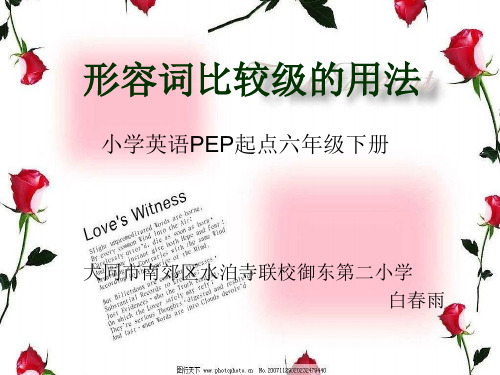
客运站安全生产教育制度1. 前言为了保障客运站工作人员安全生产,确保旅客乘车安全,促进客运行业的健康进展,特订立本客运站安全生产教育制度。
2. 教育内容2.1 总体要求客运站应依据自身安全生产和管理的实际情况,在本制度的引导下,加强本职工作的安全意识,提高安全操作本领,遵守国家、行业和单位安全生产规定和制度,削减安全事故的发生。
2.2 安全标准客运站应建立相应的安全标准、操作规范,加强安全检查和教育培训,促进安全生产责任制的落实。
并应依据安全标准和实际情况,建立和完善各项安全防护措施,如消防、防爆、防盗、防雷等措施,以保障安全生产。
2.3 安全设施客运站应建立和完善安全设施,做到防范、防备和应急处理,并订立相应的应急预案,适时处置各类安全事件,最大限度地削减安全事故的损失,确保旅客和员工的生命安全。
2.4 安全培训客运站应定期开展安全教育和培训,包括但不限于:安全规定、操作技能、应急处理等方面的学问和技能培训。
对工作人员进行必要的考核,并签订安全生产责任书,强化安全生产责任意识。
2.5 安全检查客运站应当对安全生产各方面进行关键检查,包括但不限于设备的完好性,人员的安全操作技能,应急处理程序的完善性等方面。
针对检查中发觉的问题,要适时做出改正和整改。
3. 安全生产教育的实在措施3.1 定期组织安全生产培训和考试客运站应当定期组织安全生产培训和考试,对不符合安全规定和标准的人员进行反复培训和考试,直至合格为止。
3.2 编制应急预案和演习客运站应当订立并不断完善应急预案,包括应急物资准备、应急人员组织、安全疏散等方面,并定期组织演习,以确保应急处置的专业化、标准化、协调性。
3.3 建立安全记录档案客运站应建立安全生产记录档案,包括设备情况、安全检查记录、重要负责人签字、员工培训、安全责任书等内容,以保留安全生产过程中的紧要数据和信息,为日后改进工作供给牢靠依据和参考。
3.4 管理各项安全监控设备客运站应管理好各项安全监控设备,定期检查,保持设备的完好和正常运行,对检查发觉的问题要适时整改或更换。
11:语法专练十一:小学形容词的比较级和最高级
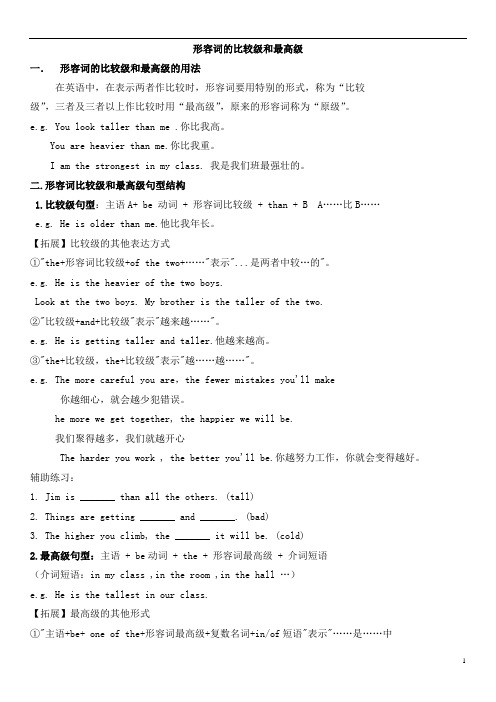
形容词的比较级和最高级一.形容词的比较级和最高级的用法在英语中,在表示两者作比较时,形容词要用特别的形式,称为“比较级”,三者及三者以上作比较时用“最高级”,原来的形容词称为“原级”。
e.g. You look taller than me .你比我高。
You are heavier than me.你比我重。
I am the strongest in my class. 我是我们班最强壮的。
二.形容词比较级和最高级句型结构1.比较级句型:主语A+ be 动词 + 形容词比较级 + than + B A……比B……e.g. He is older than me.他比我年长。
【拓展】比较级的其他表达方式①"the+形容词比较级+of the two+……"表示"...是两者中较…的"。
e.g. He is the heavier of the two boys.Look at the two boys. My brother is the taller of the two.②"比较级+and+比较级"表示"越来越……"。
e.g. He is getting taller and taller.他越来越高。
③"the+比较级,the+比较级"表示"越……越……"。
e.g. The more careful you are,the fewer mistakes you'll make你越细心,就会越少犯错误。
he more we get together, the happier we will be.我们聚得越多,我们就越开心The harder you work , the better you'll be.你越努力工作,你就会变得越好。
辅助练习:1. Jim is _______ than all the others. (tall)2. Things are getting _______ and _______. (bad)3. The higher you climb, the _______ it will be. (cold)2.最高级句型:主语 + be动词 + the + 形容词最高级 + 介词短语(介词短语:in my class ,in the room ,in the hall …)e.g. He is the tallest in our class.【拓展】最高级的其他形式①"主语+be+ one of the+形容词最高级+复数名词+in/of短语"表示"……是……中最……之一"e.g. Beijing is one of the largest cities in China.②序数词+最高级e.g. Hainan Island is the second largest island in China.辅助练习:1.The changjiang river is ____________________ (long) river in China.2. The Yellow River (Huang He) is ________________ (第二长)river in China3.A.形容词的比较级和最高级变化规则B. 部分双音节与多音节的词比较级在原级之前加more, 最高级在原级之前加most beautiful---more beautiful---most beautifulinteresting--- more interesting –most interestingdifficult--- more difficult – most difficultC.不规则变化的形容词:little / few - less – least good – better - bestbad/ill - worse – worst far -- farther/further—farthest/furthestmany/much – more – moste.g. 比较一下下列句子,领悟原级、比较级、最高级的用法。
小学英语比较级
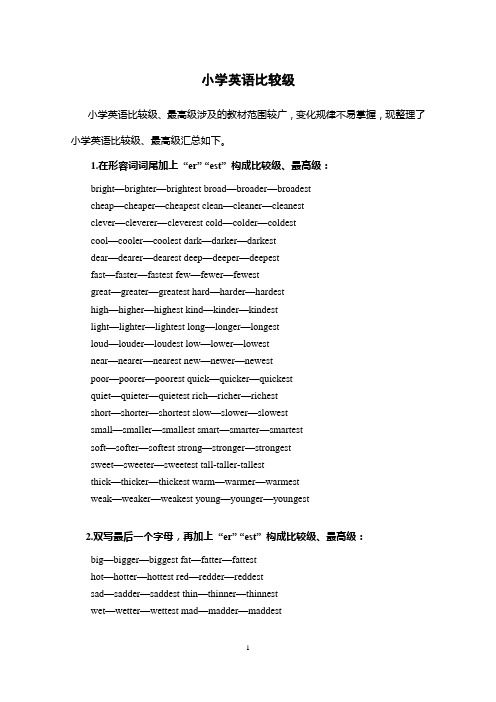
小学英语比较级小学英语比较级、最高级涉及的教材范围较广,变化规律不易掌握,现整理了小学英语比较级、最高级汇总如下。
1.在形容词词尾加上“er” “est” 构成比较级、最高级:bright—brighter—brightest broad—broader—broadestcheap—cheaper—cheapest clean—cleaner—cleanestclever—cleverer—cleverest cold—colder—coldestcool—cooler—coolest dark—darker—darkestdear—dearer—dearest deep—deeper—deepestfast—faster—fastest few—fewer—fewestgreat—greater—greatest hard—harder—hardesthigh—higher—highest kind—kinder—kindestlight—lighter—lightest long—longer—longestloud—louder—loudest low—lower—lowestnear—nearer—nearest new—newer—newestpoor—poorer—poorest quick—quicker—quickestquiet—quieter—quietest rich—richer—richestshort—shorter—shortest slow—slower—slowestsmall—smaller—smallest smart—smarter—smartestsoft—softer—softest strong—stronger—strongestsweet—sweeter—sweetest tall-taller-tallestthick—thicker—thickest warm—warmer—warmestweak—weaker—weakest young—younger—youngest2.双写最后一个字母,再加上“er” “est” 构成比较级、最高级:big—bigger—biggest fat—fatter—fattesthot—hotter—hottest red—redder—reddestsad—sadder—saddest thin—thinner—thinnestwet—wetter—wettest mad—madder—maddest3.以不发音的字母e结尾的形容词,加上“r” “st” 构成比较级、最高级:able—abler—ablest brave—braver—bravestclose—closer—closest fine—finer—finestlarge—larger—largest late—later—latestnice—nicer—nicest ripe—riper—ripestrude—ruder—rudest safe—safer—safeststrange—stranger—strangest wide—wider—widestwise—wiser—wisest white—whiter—whitest4.以字母y结尾的形容词,把y改为i,再加上“er” “est” 构成比较级、最高级:busy—busier—busiest dirty—dirtier—dirtiestdry—drier—driest early—earlier—earliesteasy—easier—easiest friendly—friendlier—friendliestfunny—funnier—funniest happy—happier—happiesthealthy—healthier—healthiest heavy—heavier—heaviesthungry—hungrier—hungriest lazy—lazier—laziestlucky—luckier—luckiest naughty—naughtier—naughtiestnoisy—noisier—noisiest pretty—prettier—prettiestsilly—sillier—silliest spicy—spicier—spiciestthirsty—thirstier—thirstiest ugly—uglier—ugliest5.双音节、多音节形容词,在单词前面加上“more” “most” 构成比较级、最高级:afraid—more afraid—most afraidbeautiful—more beautiful—most beautifulcareful—more careful—most carefulcheerful—more cheerful—most cheerfulcrowded—more crowded—most crowdeddangerous—more dangerous—most dangerousdelicious—more delicious—most delicious difficult—more difficult—most difficult exciting—more exciting—most exciting expensive—more expensive—most expensive famous—more famous—most famous frightened—more frightened—most frightened frightening—more frightening—most frightening hard-working—more hard-working—most hard-working helpful—more helpful—most helpful honest—more honest—most honest important—more important—most important interesting—more interesting—most interesting polite—more polite—most politeterrible—more terrible—most terribletired—more tired—most tired6.不规则变化的形容词:bad—worse—worstfar—farther—farthestgood—better—bestill—worse—worstlittle—less—leastmany—more—mostmuch—more—mostold—older—oldestwell—better—best。
四形容词和副词的比较级最高级

四、形容词和副词的比较级、最高级(Comparison of Adjectives and Adverbs)I. 形容词比较级和最高级的形式一、形容词比较级和最高级的构成⑥合成形容词的比较等级•大多数在前面加more及most。
例如:home-sick, more home-sick, most home-sickup-to-date, more up-to-date, most up-to-date•若第一个词是大家熟悉的单音节词,则-er及-est都加在这个词的前面。
例:Long-lasting, longer-lasting, longest-lastinghard-working, harder-working, hardest-workingKind-hearted, kinder-hearted, kindest-heartedWell-known, better-known, best-known二、不规则形容词的比较级和最高级形式II.副词比较级和最高级的形式副词比较级和最高级的变化形式与形容词基本上一样。
一、一般副词hard→harder →hardest fast→faster →fastestlate→later →latest early→earlier →earliest二、特殊副词well →better →best much →more →mostbadly →worse →worst little →less →least三、开放类副词开放类副词即以后缀-ly结尾的副词不能像形容词那样加-er或-est,而应在副词原形前加more或most。
如:quickly →more quickly →most quickly quietly →more quietly →most qui etlyIII.形容词与副词比较级和最高级的基本用法一、比较级1.比较级通常由“形容词(副词)比较级+than+…”构成,表示在两者中间一方比另一方“更加……”。
(完整版)小学英语形容词的比较级
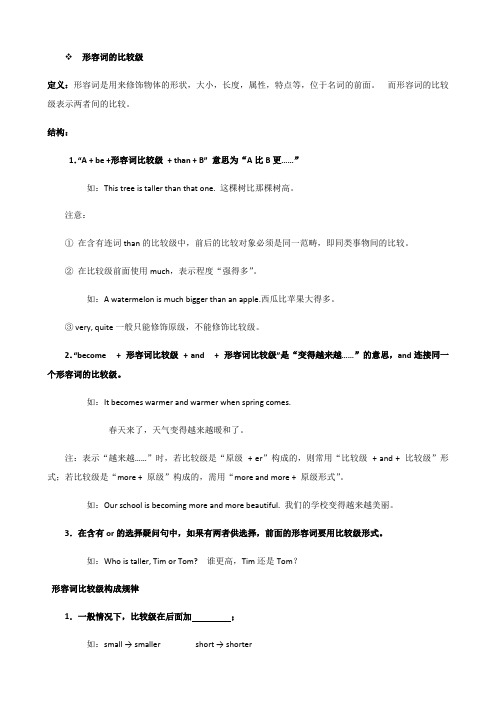
形容词的比较级定义:形容词是用来修饰物体的形状,大小,长度,属性,特点等,位于名词的前面。
而形容词的比较级表示两者间的比较。
结构:1.“A + be +形容词比较级+ than + B” 意思为“A比B更……”如:This tree is taller than that one. 这棵树比那棵树高。
注意:①在含有连词than的比较级中,前后的比较对象必须是同一范畴,即同类事物间的比较。
②在比较级前面使用much,表示程度“强得多”。
如:A watermelon is much bigger than an apple.西瓜比苹果大得多。
③ very, quite一般只能修饰原级,不能修饰比较级。
2.“become + 形容词比较级+ and + 形容词比较级”是“变得越来越……”的意思,and连接同一个形容词的比较级。
如:It becomes warmer and warmer when spring comes.春天来了,天气变得越来越暖和了。
注:表示“越来越……”时,若比较级是“原级+ er”构成的,则常用“比较级+ and + 比较级”形式;若比较级是“more + 原级”构成的,需用“more and more + 原级形式”。
如:Our school is becoming more and more beautiful. 我们的学校变得越来越美丽。
3.在含有or的选择疑问句中,如果有两者供选择,前面的形容词要用比较级形式。
如:Who is taller, Tim or Tom? 谁更高,Tim还是Tom?形容词比较级构成规律1.一般情况下,比较级在后面加;如:small → smaller short → shorter2.在重读闭音节(即:辅音+元音+辅音)中,先双写末尾的辅音字母,比较级加-er,如:big →bigger hot →hotter3.以不发音e结尾的单音节词,比较在原级后加;如:large →larger nice →nicer4.以“辅音字母+y”结尾的双音节词,,比较级加;如:easy →easier heavy →heavier5.多数多音节词,比较级在前面加;如:beautiful → more beautiful different → more different6.有少数形容词的比较级是不规则的,必须熟记。
小学英语语法-形容词

小学英语语法-形容词1. 什么是形容词?形容词是一种词性,用来描述名词或代词的特征、性质或状态。
它可以使我们更详细地了解名词或代词的特点。
2. 形容词的用法形容词可以用来修饰名词或代词,通常放在名词或代词前面。
下面是一些例子:- a beautiful flower(一个漂亮的花)- an interesting book(一本有趣的书)- the tall tree(那棵高大的树)- my lovely cat(我可爱的猫)3. 形容词的比较级和最高级形容词有比较级和最高级两种形式,用来表达不同程度的比较。
比较级用于比较两个事物,最高级用于比较三个或更多事物。
- 比较级的构成:形容词原形 + er,例如:taller(更高的),bigger(更大的)- 最高级的构成:形容词原形 + est,例如:tallest(最高的),biggest(最大的)下面是一些使用比较级和最高级的例子:- This book is more interesting than that one.(这本书比那本书更有趣。
)- This is the tallest building in the city.(这是这座城市最高的建筑。
)4. 形容词的修饰范围形容词不仅可以修饰名词或代词,还可以修饰整个句子。
这时,形容词通常放在句子的最前面,用来表达说话人的感受或观点。
下面是一些使用形容词修饰句子的例子:- Amazingly, he finished the race in record time.(令人惊讶的是,他以创纪录的时间完成了比赛。
)- Unfortunately, the concert was canceled due to bad weather.(不幸的是,由于天气不好,音乐会被取消了。
)5. 形容词的数量和位置当形容词用于修饰复数名词时,通常位于名词的前面,并在形容词和名词之间加上 "s"。
小学英语形容词、副词比较级:更高的建筑
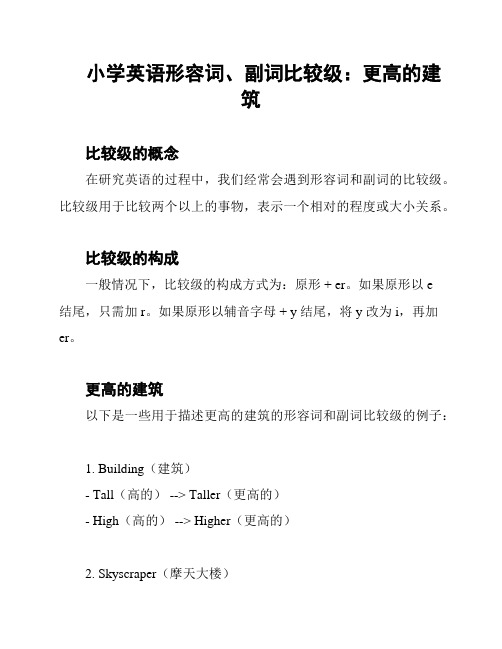
小学英语形容词、副词比较级:更高的建筑比较级的概念在研究英语的过程中,我们经常会遇到形容词和副词的比较级。
比较级用于比较两个以上的事物,表示一个相对的程度或大小关系。
比较级的构成一般情况下,比较级的构成方式为:原形 + er。
如果原形以 e结尾,只需加 r。
如果原形以辅音字母 + y 结尾,将 y 改为 i,再加er。
更高的建筑以下是一些用于描述更高的建筑的形容词和副词比较级的例子:1. Building(建筑)- Tall(高的) --> Taller(更高的)- High(高的) --> Higher(更高的)2. Skyscraper(摩天大楼)- Tall --> Taller- High --> Higher3. Tower(塔)- Tall --> Taller- High --> Higher4. Bridge(桥)- Long(长的) --> Longer(更长的)- Far(远的) --> Farther(更远的)5. Mountain(山)- High --> Higher- Steep(陡峭的) --> Steeper(更陡峭的)以上仅是一些常见的比较级形式,随着研究的深入,我们还可以研究更多变化丰富的比较级形式。
总结形容词和副词的比较级用于描述更高的建筑时,可以通过在原词后加上 er 的方式构成。
需要注意的是,有些词需要改变拼写。
通过研究不同类型的建筑,我们可以进一步丰富我们的词汇量,并更好地表达我们的观点。
以上是关于小学英语形容词、副词比较级:更高的建筑的简要介绍。
希望对你的学习有所帮助!。
- 1、下载文档前请自行甄别文档内容的完整性,平台不提供额外的编辑、内容补充、找答案等附加服务。
- 2、"仅部分预览"的文档,不可在线预览部分如存在完整性等问题,可反馈申请退款(可完整预览的文档不适用该条件!)。
- 3、如文档侵犯您的权益,请联系客服反馈,我们会尽快为您处理(人工客服工作时间:9:00-18:30)。
❖形容词的比较级定义:形容词是用来修饰物体的形状,大小,长度,属性,特点等,位于名词的前面。
而形容词的比较级表示两者间的比较。
结构:1.“A + be +形容词比较级+ than + B” 意思为“A比B更……”如:This tree is taller than that one. 这棵树比那棵树高。
注意:①在含有连词than的比较级中,前后的比较对象必须是同一范畴,即同类事物间的比较。
②在比较级前面使用much,表示程度“强得多”。
如:A watermelon is much bigger than an apple.西瓜比苹果大得多。
③ very, quite一般只能修饰原级,不能修饰比较级。
2.“become + 形容词比较级+ and + 形容词比较级”是“变得越来越……”的意思,and连接同一个形容词的比较级。
如:It becomes warmer and warmer when spring comes.春天来了,天气变得越来越暖和了。
注:表示“越来越……”时,若比较级是“原级+ er”构成的,则常用“比较级+ and + 比较级”形式;若比较级是“more + 原级”构成的,需用“more and more + 原级形式”。
如:Our school is becoming more and more beautiful. 我们的学校变得越来越美丽。
3.在含有or的选择疑问句中,如果有两者供选择,前面的形容词要用比较级形式。
如:Who is taller, Tim or Tom? 谁更高,Tim还是Tom?形容词比较级构成规律1.一般情况下,比较级在后面加;如:small → smaller short → shorter2.在重读闭音节(即:辅音+元音+辅音)中,先双写末尾的辅音字母,比较级加-er,如:big →bigger hot →hotter3.以不发音e结尾的单音节词,比较在原级后加;如:large →larger nice →nicer4.以“辅音字母+y”结尾的双音节词,,比较级加;如:easy →easier heavy →heavier5.多数多音节词,比较级在前面加;如:beautiful → more beautiful different → more different6.有少数形容词的比较级是不规则的,必须熟记。
如:good/well → _ bad→ _ old→ many/much→ little→ far → 专项练习:一、写出下列形容词的比较级old__________ young________ tall_______ long________short________ strong________ big________ small_______fat_________ thin__________ heavy______ light________nice_________ good_________ beautiful__________________low__________ high_________ slow_______ fast________二、翻译句子:1、谁比Jim年纪大?是你。
________ is _________than Jim?________ are2、谁比David更强壮?是Gao Shan.________ _________ than David? Gao Shan ________.3、谁的铅笔更长,他的还是她的?我想是她的。
_________ pencil is _________,______or________?________is,I think.4、谁的苹果更重,你的姐姐的还是你的弟弟的?我的弟弟的。
_________ apples ________ ________,your _______ or your _______?My ____________ ___________.5、你和你的叔叔一样高吗?是的。
_________ ________as _________as your uncle?Yes,I am.6、他和他的朋友Jim一样年轻。
He _______ as __________ as ________ ________ Jim.7、她和她的双胞胎哥哥一样胖吗?不,她比他瘦。
________ ________ as _________ as______ twin _______?No, _________ _________ than him.8.Yang Ling每天睡得比SuYang晚。
Yang Ling ________ to _______ ________ than Su Yang every day.9.我跳得和Mike一样远。
I _________ as _______ as Mike.10.Tom比你跑得快吗?不是的,他和我跑得一样快。
____ Tom _____ _____ than you?No,he _______. He_____ as_____ as_____.11.多做运动,你会更强壮。
________ more exercise,you’ll ________ _________ soon.12.我的科学很好,但是语文不好。
I ______ ________ at Science.But I don’t _________ well in Chinese.13. 你放风筝比王兵放得高吗?不,我比他放得低。
____you_______the kite_____than Wang bing?No,I______it _____than___.14.我喜欢游泳。
我所有的朋友都游得比我慢。
I like_______.All my______ _______ _______than me.❖形容词的最高级定义:形容词、副词的最高级形式主要用来表示三者或三者以上人或事物的比较,表示“最……”的意思。
结构:三者或三者以上物体比较用最高级,最高级通常在词尾加est.句子中有表示范围的词或短语。
如:of the three, in our class等等。
He is the tallest in our class. 他在我们班里是最高的。
注意:形容词最高级前一定要有定冠词the,而副词最高级前则不需要。
形容词最高级构成规律:1.一般情况下,最高级在后面加;如:small → smallest short → shortest2.在重读闭音节(即:辅音+元音+辅音)中,先双写末尾的辅音字母,,最高级加-est;如:big → biggest hot → hottest3.以不发音e结尾的单音节词,最高级在原级后加;如:large → largest nice → nicest4.以“辅音字母+y”结尾的双音节词,,最高级加;如:easy → easiest heavy → heaviest5.多数多音节词,最高级在前面加;如:beautiful → most beautiful different → most different6.有少数形容词、副词的比较级和最高级是不规则的,必须熟记。
如:good→ bad → old →many/much → little → far →注意: 形容词最高级前一定要有the, 而副词最高级则不需要。
总结规则变化不规则变化专项练习:一、写出下列形容词的最高级。
3.tall16.dark32.beautiful4.young19.big34.expensive 6.strong20.thin35.important9.high21.hot36.differentrge39.bad/ill 12.high24.heavy40.far14.cheap26.easy41.old15.bright29.pretty30.funny二、单项选择1. The whale is the ( ) animal.A. heavyB. heavierC. heaviestD. ligthest2. ( ) hair is the longest?A. WhoB. WhoseC. WhomD. What3. The giraffe is the ( ) animal.A. tallestB. smallerC. tallD. smallest4. Ruby is the ( ) dancer.A. bestB. goodC. betterD. bestest5. Josh is the ( )at singing.A. badB. goodC. worstD. better课后作业一、根据句意填入单词的正确形式。
1.My brother is two years _________ (old) than me.2. Is your sister _________ (young) than you? Yes, she is.3. Who is __________ (thin),you or Helen? Helen is.4. Whose pencil-box is _________ (big), yours or hers? Hers is.5.Ben jumps ________ (high) than some of the boys in his class.6.Does Nancy sing __________ (well) than Helen? Yes, she does.7.My eyes are __________(big) than hers.8.Which is __________ (heavy), the elephant or the pig?9.Who gets up ________ (early), Tim or Tom?10.Do the girls get up_______(early) than the boys? No, they______.11.Jim runs _____ (slow). But Ben runs _____ (slow).二、选择。
()1. The yellow shoes are than the blue ones.A.expensiveB. expensiverC. more expensive()2. A cow is bigger than a mouse.A.muchB.moreC.many()3. Who’s the ,Jean,Joan or Jennet?A.thinnerB.thinestC.thinnest()4. Tim is than Jack.A.funnyB.much funnyC.funnier()5. I’m taller than others in my class.I’m .A.tallB.tallestC.the tallest()6. Who can sing better Rose?A.thanB.thenC./()7. I have books than you have.A.manyB.muchC.more()8. His uncle’s house is very .A.oldB.olderC.oldest()9. My bike is ,but his bike is .A.new,newB.new,newerC.new,newest()10. Please clean your room.It’s now.A.cleanB.dirtyC.tidy四、翻译句子。
